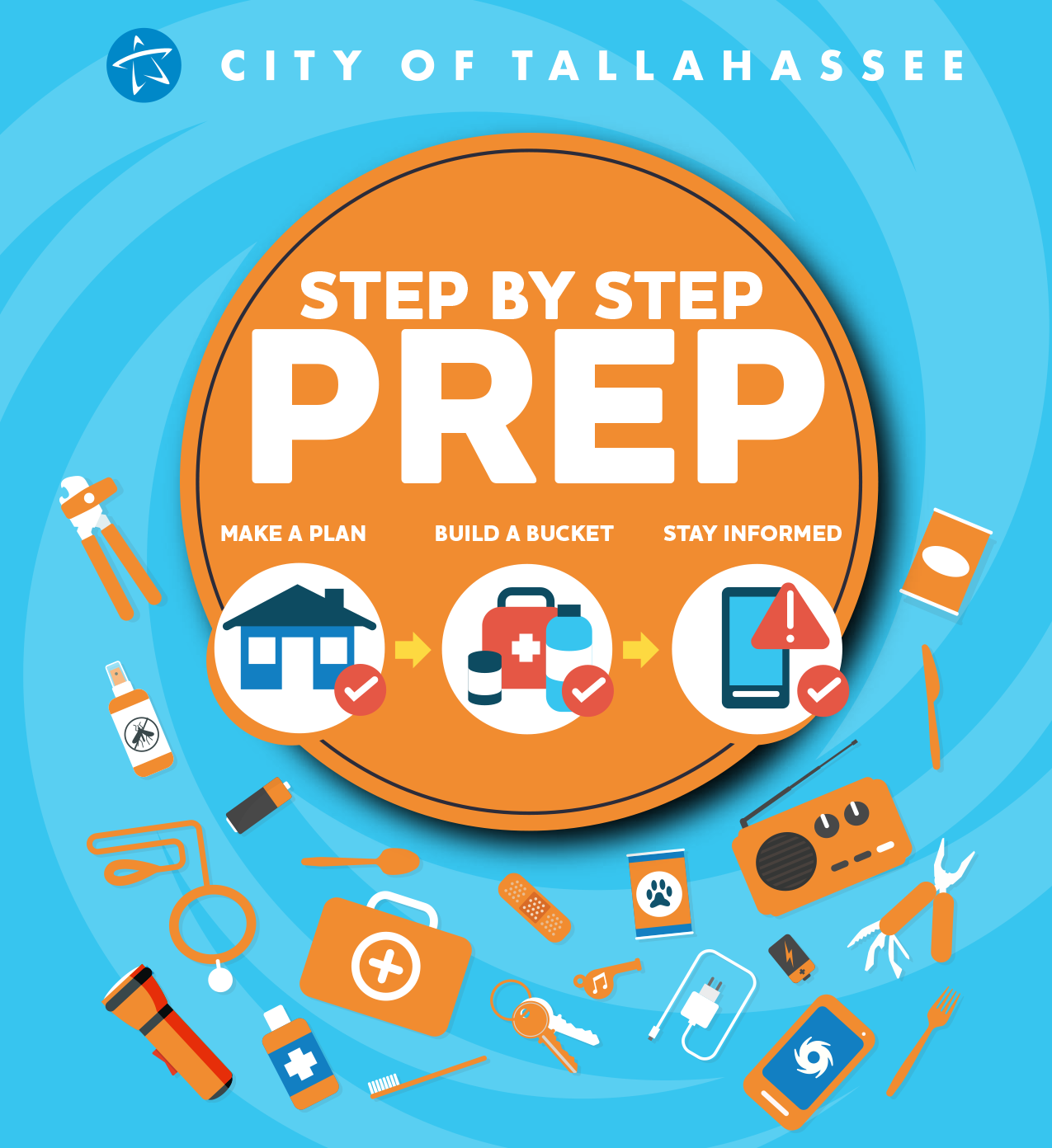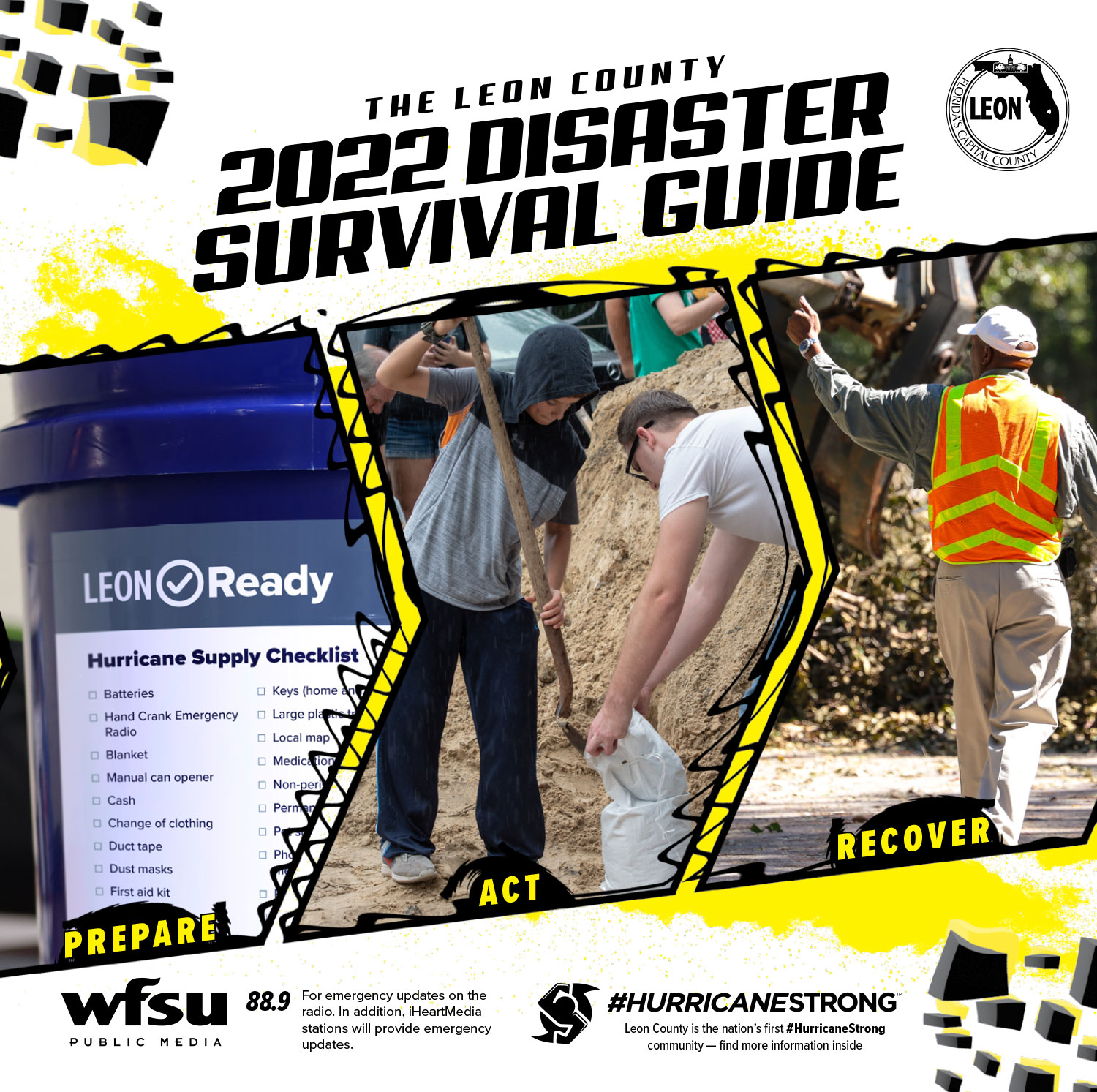Hurricane Kits
- Non-perishable food (enough to last at least 3 days)
- Water (enough to last at least 3 days)
- First-aid kit (include any prescription medication you may need)
- Personal hygiene items and sanitation items
- Flashlights (have extra batteries on hand)
- Battery operated radio (again, have extra batteries)
- Waterproof container with cash and important documents
- Manual can opener
- Lighter or matches
- Books, magazines, games for recreation
- Special needs items: pet supplies and baby supplies if applicable
- Cooler and ice packs
- A plan for evacuation and for if family members are separated
Securing Your Home
- Cover all of your windows, either with hurricane shutters or wood.
- Although tape can prevent glass from shattering everywhere, be warned that tape does not prevent the window from breaking.
- If possible, secure straps or clips to securely fasten your roof to the structure of your home.
- Make sure all trees and shrubs are trimmed and clear rain gutters.
- Reinforce your garage doors.
- Bring in all outdoor furniture, garbage cans, decorations, and anything else that is not tied down.
- If winds become strong, stay away from windows and doors and close, secure and brace internal doors.
Power Outages
- Gas: Make sure your tank is full far in advance of an approaching storm. Most people wait until the last minute, rush to get extra gas for cars and generators, and subsequently gas stations can run out early.
- ATMS: Have extra cash on hand in the event no ATMS in your area are accessible or working.
- Cell Phones: Charge your cell phone and limit use after power is out.
- A/C: This can be the most uncomfortable side effect of losing power during a storm. Try to prevent as much light from entering and warming the house by covering up your windows on the inside. If you have back-up or battery operated fans, don’t run them unless you are in the room. Fans create a difference in perceived temperature but do not cool the room; instead they create a cooling effect by dispersing the heat off your skin. It is said they can actually add heat to a room just by running.
- Water: Fill bathtub and large containers with water for washing and flushing only.
- Food: Turn your fridge temperature down and/or freeze any food or drinking water that can be frozen if you expect a power outage. Here is a guide on freezing food: Freezing and Food Safety. Have a cooler with ice packs prepared to cool your drinks and snacks after power has been out for more than 4 hours. And importantly, check out this food safety guide for when to discard your perishable food: http://www.foodsafety.gov/keep/charts/refridg_food.html
- Health/Safety: The CDC has a great guide on how to stay safe in the event of a power outage: Power Outages
Step 1: Put together a plan by discussing these 4 questions with your family, friends, or household to start your emergency plan.
- How will I receive emergency alerts and warnings?
- What is my shelter plan?
- What is my evacuation route?
- What is my family/household communication plan?
Step 2: Consider specific needs in your household.
As you prepare your plan tailor your plans and supplies to your specific daily living needs and responsibilities. Discuss your needs and responsibilities and how people in the network can assist each other with communication, care of children, business, pets, or specific needs like the operation of durable medical equipment. Create your own personal network for specific areas where you need assistance.
Step 3: Create an Emergency Plan
You can download a America’s PrepareAthon template plan.
Step 4: Practice your plan with your family/household
Planning together with your neighborhood increases overall community safety and helps provide a coordinated response to disaster recovery activities. To guide residents through the planning process, the City offers its Neighborhood Plan for Readiness and Emergency Preparedness (PREP) program. The City of Tallahassee urges residents to take the steps necessary to prepare and protect their families, property and pets. In this colorful guide, you’ll learn what to do before, during and after storms, as well as information about City services. You can download the Step by Step Prep guide and get a jump start on being prepared.
Hurricane Connection: https://www.talgov.com/publicsafety/emergency-hurricane
Flood Preparedness: https://talgov.com/publicsafety/emergency-flood
Protecting Your Pets: https://www.talgov.com/publicsafety/emergency-pets
Sandbag sites are available at the Mike Blankenship Skate Park (2909 Jackson Bluff Road) and in the south parking lot of the Northwood Centre (1940 North Monroe). Sandbags are limited to 25 bags per household. Citizens need to bring shovels to fill bags themselves. Locations will not be staffed, but crews will monitor and provide additional sand and bags as needed. The site will be open until the storm threat has passed and it is determined there is no longer a need.
Citizens are encouraged to sign up to receive City news releases at Talgov.com/Subscribe. They can also stay informed about City services as this weather system develops by following @CityofTLH on Twitter and Facebook and checking Talgov.com regularly.
Leon County is a resilient community filled with local officials, neighborhood leaders, and community partners working around the clock during disaster to keep us safe. Thanks to our community members’ resilience and preparedness, the Federal Alliance for Safe Homes (FLASH) and the Federal Emergency Management Agency (FEMA) designated Leon County as the first #HurricaneStrong community in the nation, making us the model for resilience everywhere. We are proud to be #HurricaneStrong and Leon County remains committed to keeping citizens informed and prepared for emergencies.
Evacuation Route and Zone Maps: View the Leon County Evacuation Map
Leon County (sandbags): Will staff these sites and sandbag fillers are now available to assist residents in quickly filling sandbags. Sand, bags and ties will be available for public use. Residents are asked to take no more than 15 bags so as to allow others to prepare. Property owners who have experienced flooding problems in the past can use sandbags to help divert stormwater from their property.
*Leon County’s Northeast Branch Library (5513 Thomasville Road)
*Apalachee Regional Park (Solid Waste Management Facility, 7550 Apalachee Parkway)
*Fred George Park (3043 Capital Circle NW)
*At the intersection of Oak Ridge Road at Ranchero Road
Prepare Yourself
Tools and resources to help you and your family prepare for any disaster. You will also find information about current hazards and important information on what to do before, during and after public health emergencies.
Community Preparedness
Community Resilience relies on the ability to develop informed, empowered, and resilient health care systems and residents.
Healthcare System Preparedness
Healthcare System Preparedness ensures that there is capacity and capability for provision of critical public health and medical services in order to reduce the potential for adverse health outcomes during any event.
Florida Department of Children and Families
The Department of Children and Families is releasing food assistance benefits earlier than scheduled to Floridians who may be impacted by Hurricane Ian. This is an early release of regular benefits, not a distribution of additional funds. There is no need to apply for the early release; eligible recipients will have the benefits automatically added to their EBT card. If you were scheduled to receive benefits between October 1st through October 14th, your benefits are now being uploaded to your EBT card. If you are scheduled to receive your benefits between October 15th through October 28th, they will be issued at the regular scheduled time.
Preparedness Training, Exercise and Evaluation
Ensuring that Florida’s public health and health care system along with our supporting partners are properly trained, practice their response roles, perform response duties, and are prepared to respond to any and all hazards.
Environmental Health Preparedness
Leveraging resources through proactive planning and strategic collaboration with a variety of local, state and federal partners to evaluate and prevent potential health risks from chemical, biological, radiological and physical agents in the environment.
Florida’s Special Needs Registry
Florida’s Department of Health assists with keeping a current database of individuals with disabilities or special needs. This is a statewide portal, but each county has its own process and forms for registration, and many forms are downloadable from the website. You must update your form manually to be certain your information is up-to-date. Special Needs registries are primarily managed by each county’s sheriff’s office. Go to https://www.floridadisaster.org/shelters for special needs sheltering information by county.
Disaster Response Resources
Florida’s disaster response teams as well as the resources to stay informed and ensure that plans, personnel, equipment, and systems are in place to protect the safety and health of responders.
Preparedness Planning
Provides for a systematic framework to develop, implement, evaluate, and improve plans across the emergency management cycle.
Florida’s Home Hardening Tax-Free Initiative
Do you want to learn how to secure your property before a disaster and recover afterwards? These resources will help understand how to protect your homebase.
- American Red CrossWebsite: www.redcross.org
- Federal Emergency Management Agency (FEMA)1-800-621-FEMA (1-800-621-3362)
TTY: 800-462-7585
Website: www.fema.gov
770-220-5200 (Local: Region IV Regional Office) - National Hurricane Center (NOAA)Website: www.nhc.noaa.gov
- Florida Department of Economic Opportunity Website: www.floridajobs.org
- Florida Department of Elder Affairs 1-800-96-ELDER or 1-800-963-5337
Website: https://elderaffairs.org/
- Citizens Property Insurance Corporation Website: www.citizensfla.com
- Florida Surplus Lines Website: www.fslso.com
- Insurance Information Institute Website: www.iii.org/article/hurricane-season-insurance-guide


